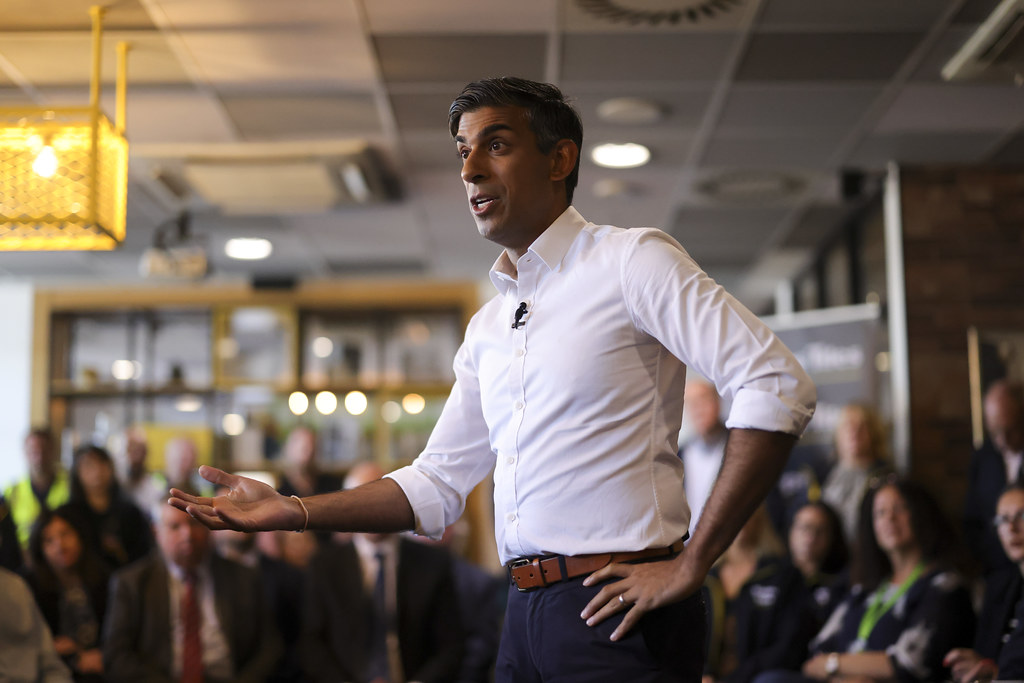Former PMs Cameron and Johnson say the decision showed the country was heading in the wrong direction…reports Asian Lite News
Rishi Sunak unleashed a Tory civil war on Wednesday by announcing the scrapping of the northern leg of HS2 as the former prime minister David Cameron said the decision showed the country was heading in the wrong direction.
After days of frenzied speculation over the future of the flagship levelling-up project, Sunak confirmed he was axing the Birmingham to Manchester line and would use the £36bn of savings to fund a number of other transport schemes, described as “Network North”.
Cameron led a torrent of criticism of the announcement, which it emerged was made without consulting the cabinet, parliament, local councils or Network Rail, saying it passed up a once-in-a-generation opportunity.
“It will help to fuel the views of those who argue that we can no longer think or act for the long-term as a country; that we are heading in the wrong direction,” he warned.
Cameron said the announcement threw away “15 years of cross-party consensus, sustained over six administrations, and would make it much harder to build consensus for any future long-term projects”.
However, Sunak told Tory activists in Manchester that he was focused on the long term as he presented himself – the fifth Tory prime minister in 13 unbroken years of the party’s rule – as the change candidate at the next election.
“At the next election the choice that people face is bigger than party politics,” he said.
“Do we want a government committed to making long-term decisions, prepared to be radical in the face of challenges and to take on vested interests, or do we want to stand still and quietly accept more of the same? You either think this country needs to change, or you don’t. And if you do, you should stand with me and every person in this hall, you should stand with the Conservatives.”
He directly challenged critics of his HS2 plans including former prime ministers Boris Johnson and Theresa May, as well as the West Midlands mayor, Andy Street, who pulled back from the brink of quitting the Tory party.
“I say to those who backed the project in the first place, the facts have changed. The right thing to do when the facts change is to have the courage to change direction,” he said.
Cameron was joined by Johnson, who replied to his post on X, formerly known as Twitter, criticising the announcement simply with: “I agree.”
Sunak was accused of the “biggest and most damaging U-turn in the history of UK infrastructure” by the rail industry despite a promise to divert funds into transport schemes in the Midlands and north, including some already under way, as well as projects previously paused or cancelled by the government.
Sunak had insisted all week that no final decision had been made on scrapping the Manchester leg. However, he later posted a video online – outlining why he had made the decision – that had been recorded in No 10 at least three days before the conference.
Sunak’s speech was peppered with references to the future. However, Sunak glossed over the Tories’ 13 years in power and Truss’s disastrous 49-day premiership in particular. “I came into office in difficult circumstances, and I don’t want to waste time debating the past because what matters is the future,” he said.
Despite speculation that Sunak could offer tax cuts before the election, as Tory MPs have repeatedly urged him to do, he refused to do so in his speech. “I know you want tax cuts, I want them too – and we will deliver them,” he said. “But the best tax cut we can give people right now is to halve inflation and ease the cost of living.”
The speech otherwise stuck to largely familiar Conservative themes such as immigration, crime, the unions and the benefits system, in addition to a section on culture wars that included a strong attack on trans rights.
“We shouldn’t be bullied into thinking people can be any sex they want to be. A man is a man and a woman is a woman and that’s just common sense,” he said.
Sunak told the Tory right, who have been urging withdrawal from the European convention on human rights, that while he was “confident” his hardline Rwanda policy would not breach international law, he would do “whatever is necessary” to stop Channel crossings.
The European Political Community meets in Spain on Thursday, where Sunak will co-chair an event with Italy’s hardline leader, Giorgia Meloni, on illegal migration. The two prime ministers are expected to call for more coordinated action.
Cabinet minister Penny Mordaunt gave Sunak’s warm-up speech, framing the battle against Labour as a return to the 1980s.
She paid tribute to Tory former cabinet minister Norman Tebbit and described Labour as “the sons and daughters of [Arthur] Scargill”, adding: “They want to return us to the 1980s. We are not for returning.”
She concluded by channelling US senator John McCain’s 2008 Republican presidential nomination acceptance speech to “stand up, stand up, stand up and fight”. McCain later lost the US election to Barack Obama.

